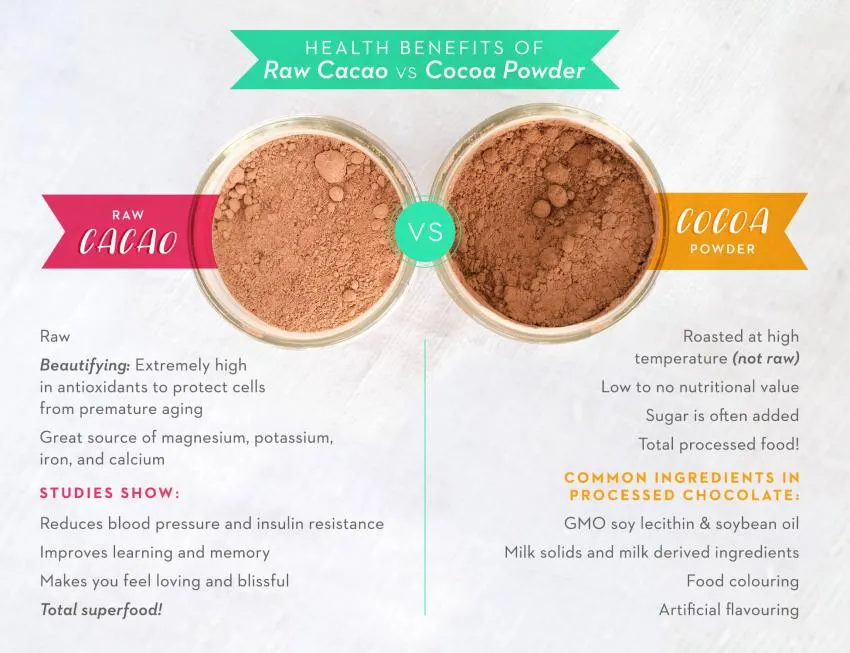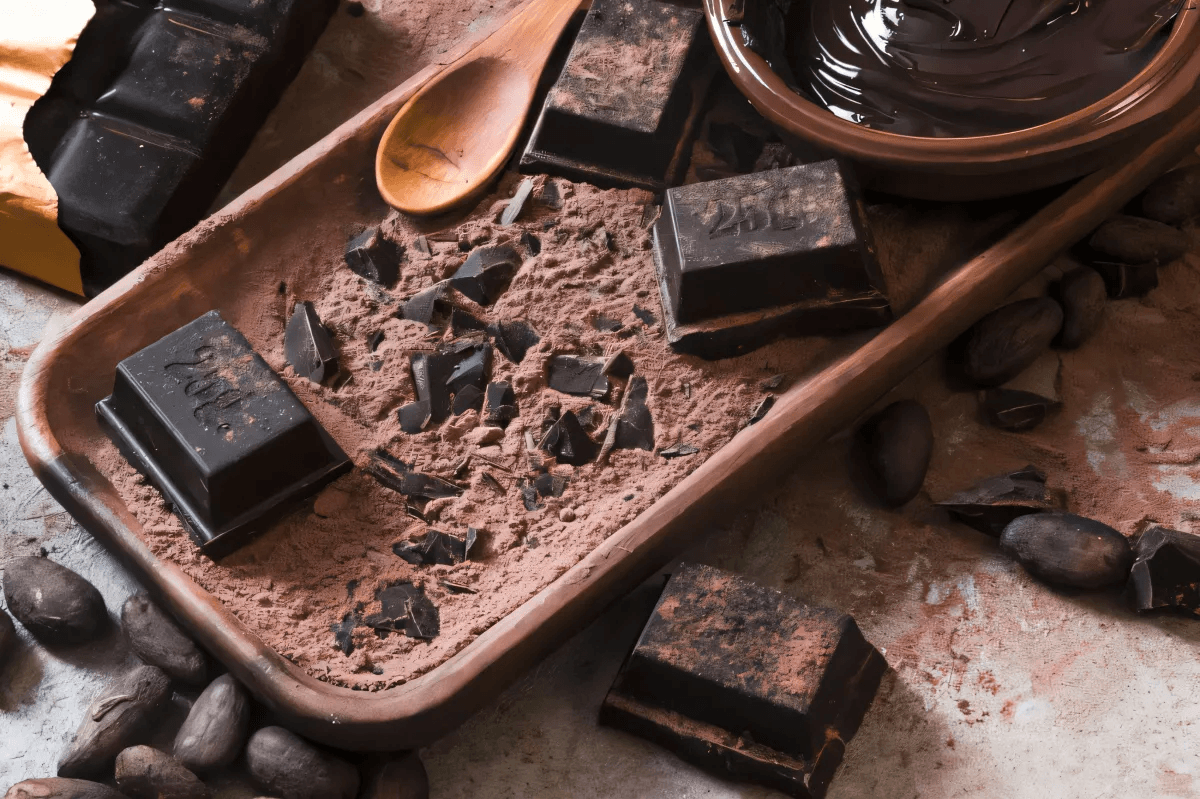Cacao, Cocoa And Ceremonial Cacao: What's The Difference?
If you're reading this, you're probably a chocolate lover much like myself. Dark, milk, or white, it doesn't matter you probably like them all.
Now, I know many shy away from dark chocolate just like I do with white chocolate.
Still, no matter what type of chocolate you choose, it is a product that sells around $98 billion dollars worldwide each year, according to Statista.
The International Cocoa Organization or ICCO estimated that "the organic cocoa market represents a very small share of the total cocoa market, estimated at less than 0.5% of total production".
At the same time, the ICCO admitted that global organic chocolate sales were estimated to have increased from a value of US$171 million dollars in 2002 to US$ 304 million dollars in 2005.
But, what is the difference between normal and organic chocolate? I mean, isn't chocolate just chocolate?
According to experts in the subject, cacao and cocoa aren't necessarily the same thing nor are they processed the same way.

Cacao vs Cocoa: Main Differences
In modern days, cacao can be seen as the basic ingredient in chocolate.
But, recently we have been hearing more of the terms "cacao" and "cocoa" as if they were referring to different things. This is because cacao, in some cases, is considered to be the "organic" or "raw" version of cocoa.
According to Marsha McCullock, a registered dietitian and nutritionist, the words cacao and cocoa are used inconsistently and interchangeably. Due to them being used to sometimes refer to the process the cacao beans go through or the words that the manufacturers want to use for packaging and marketing.
Despite this, sites like One Green Planet and All recipes (both food and recipes sites), make a distinction between cacao and cocoa. In both cases, the cacao beans are separated from the cacao butter and fermented.
Both sites coincide in that, in order for the product to be designated as cacao, it must be dried and overall processed at low temperatures to later be crushed into powder or cut into smaller pieces called cacao nibs.
On the other hand, cocoa is roasted and processed at much higher temperatures and may or may not have sugar and dairy added to it.
So, the difference here is the temperature it is processed under and the additional ingredients that may be added after like sugar and dairy.
The problem with higher temperatures though, is that they reduce the nutrients and minerals that the cacao has, although it still retains some, as stated by McCullock in her article.
Another difference between cacao and cocoa is the price, where cacao will usually go at a higher price than cocoa because of the rawness that the cacao keeps after it is processed.

Some Nutrients, Health and Medicinal benefits of cacao
When it is near raw form, cacao is an excellent source of minerals and antioxidants.
According to McCullock, cacao is rich in iron and flavonols, that have anti-oxidant, heart-protective, and anti-cancer properties. McCullock also states that cacao contains tryptophan, a precursor to serotonin the "happy chemical", which contributes to producing happiness in the person.
WebMD, lists lower blood pressure, reduced diabetes risk, reduced heart disease risk, reduced inflammation and reduced risk of digestive problems; and promotion of healthy digestion as other benefits that cacao has on the body.
WebMD also states that cacao powder is an excellent source of iron, protein, magnesium, potassium, and fiber.
Still, cacao can contain many calories so it should be consumed in moderation.
Ceremonial Cacao, what is it?
Ceremonial cacao is cacao but processed differently, as it uses the cacao butter instead of discarding it. Ceremonial cacao also has the particularity that it is used in spiritual rituals or ceremonies.
Romani Rose Pope, a healer, and herbalist describe the process in an article:
Ceremonial cacao is made by fermenting and lightly toasting or sun-drying the beans, then feeling the husks (usually by hand) and stone grinding them down to create a paste which is set into a block, nothing added, nothing removed. The bean's fat remains intact, helping to balance its stimulating properties and facilitate absorption over a longer period of time.
- Pope, 2017
You can see how ceremonial cacao is made below in a video created by CacaoLaboratory:
In addition to how it is made, ceremonial cacao businesses like Firefly Chocolate, say that for the cacao to be ceremonial cacao it also needs to have a certain energetic standard.
Firefly Chocolate, states that this energetic standard comes mainly from the land where the tree is cultivated and the beans are sourced; how the cacao beans are treated and the people handling them.
As you can see there is an energetical, come could say even mystical and magical aspect to ceremonial cacao.
Ceremonial Cacao: How is it used?
Cacao ceremonies have been taking place for thousands of years in Mesoamerica. According to ChocoVivo, a ceremonial cacao company, the Mesoamericans consumed it in liquid form and used it in important rituals such as weddings, births, and sacrifices as an offering to the gods.
Nowadays, the newer generations that are learning about cacao ceremonies mostly use it for meditation, self-reflection, gratitude, setting intentions, etc. People may choose to have a cacao ceremony by themselves or with a group.
Whatever you decide though, it is always encouraged to get to know the cacao and make the ceremony all your own.
Opinions and Perspectives
Wish more chocolate makers would be transparent about their processing methods.
Think I'll start incorporating some raw cacao into my diet. The benefits seem worth exploring.
Fascinating how something as simple as processing temperature can affect nutrition so much.
Finding good ceremonial cacao is challenging but worth it for the pure experience.
The connection to serotonin production explains a lot about my chocolate cravings!
Never thought about chocolate having spiritual significance. This article opened my eyes.
After reading this, I understand why my vegan friends are so particular about their chocolate choices.
The global market value shows how much we love chocolate, but we need to support better practices.
Making my own chocolate with raw cacao has become a mindful practice. It's quite therapeutic.
The energetic standard concept is intriguing. Has anyone noticed a difference with ceremonial grade?
This explains why some dark chocolates taste so different from others. It's all in the processing.
I've started paying attention to sourcing and it's made such a difference in taste quality.
The stone grinding process reminds me of traditional Mexican chocolate preparation.
Surprised to learn about the magnesium content. No wonder I crave chocolate during certain times.
The anti-inflammatory properties have helped with my joint pain. Who knew chocolate could be medicine?
Been using raw cacao for years and can confirm the mood-boosting effects are real.
Love that this article explains why ceremonial cacao costs more. The handling process is so intricate.
Interesting how the manufacturing process can completely change the properties of the final product.
The description of ceremonial cacao preparation is beautiful. It's like an art form.
I've noticed raw cacao gives me energy without the jitters I get from coffee.
Wonder if the ancient Mesoamericans knew about all these health benefits or just enjoyed the taste.
The difference in price makes sense now considering the careful processing required for raw cacao.
Raw cacao in smoothies is great but be careful not to overdo it. I learned that lesson the hard way!
The fermentation process sounds crucial. Anyone know how long proper fermentation takes?
I'm amazed by how the cacao butter plays a role in absorption. Nature really thinks of everything.
Finally understanding why my nutritionist keeps insisting on raw cacao instead of regular cocoa powder.
The market growth statistics are impressive but I hope it doesn't lead to quality compromise.
Never knew about the spiritual aspect. Makes me view my daily chocolate habit in a whole new light!
Really appreciate the breakdown of different types. Been confused about this for ages.
The mention of tryptophan explains why chocolate has always been my go-to mood lifter!
I'd love to know more about how to properly store raw cacao. Does anyone have experience with this?
The processing temperature effect on nutrients is fascinating. Makes me think twice about my chocolate choices.
Thanks for sharing this info about the iron content. As someone with anemia, I'm always looking for natural sources.
I've been using raw cacao in my baking and the results are amazing. The flavor is so much more complex.
The article doesn't mention this, but the taste difference between raw cacao and processed cocoa is quite significant.
Wonder if the growing popularity of cacao ceremonies will lead to more sustainable farming practices?
Just learned that chocolate isn't just chocolate and honestly my mind is blown. There's so much more to it than I thought.
Pretty sure my wallet isn't going to like my new interest in ceremonial cacao, but my taste buds will!
The distinction between processing temperatures is crucial information. I wish more companies were transparent about this.
I tried making hot chocolate with raw cacao once and it was a disaster. Definitely need to learn proper preparation techniques.
This makes me want to start sourcing my chocolate more carefully. Any recommendations for ethical brands?
While I appreciate the health benefits of raw cacao, nothing beats a good old chocolate bar sometimes.
The $98 billion industry figure is mind-blowing. No wonder big companies are trying to cut corners with processing.
I love learning about the traditional preparation methods. The stone grinding process must add such a unique texture.
The serotonin connection explains why I always feel happier after having some good quality dark chocolate.
My grandmother was right all along about dark chocolate being good for the heart. Science is finally catching up to her wisdom!
I respectfully disagree about the energetic standards mentioned. That sounds like marketing speak to justify higher prices.
The temperature processing difference explains why raw cacao tastes so different from regular cocoa. Now I understand why my recipes haven't been turning out the same.
Anyone else find it funny how we've turned an ancient ceremonial substance into Easter bunnies and Halloween candy?
The historical use in Mesoamerican ceremonies is really interesting. It shows how long humans have recognized the special properties of this plant.
I've switched to raw cacao in my morning smoothies and honestly feel more energized than with regular cocoa powder.
That stat about organic chocolate being less than 0.5% of total production is shocking. We really need to support more sustainable farming practices.
The price difference between cacao and cocoa is significant. I noticed raw cacao powder costs almost three times more at my local store.
Does anyone know where to find good quality ceremonial cacao? I'd love to try it but want to make sure I'm getting the real thing.
Interesting read but I'm skeptical about all these health claims. Sure it has antioxidants, but let's not pretend chocolate is a superfood.
The ceremonial aspect of cacao is fascinating. I've participated in a group ceremony and the experience was incredibly grounding.
I had no idea there was such a big difference between cacao and cocoa! I've been using them interchangeably in my recipes all this time.
